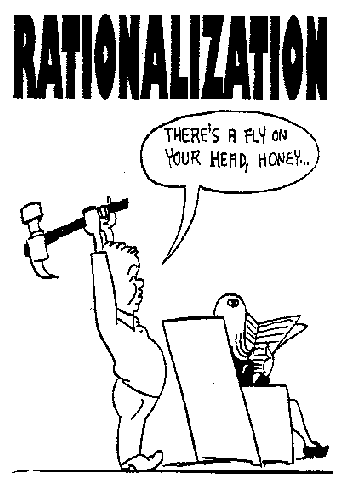
 A recent article from the WSJ described how Resorts and Hotels are dropping the word ‘resort’ from their names in order to attract business. As tolerance for corporate excess becomes less fashionable, companies want to ‘appear’ to be scaling back on business trips and conferences.
A recent article from the WSJ described how Resorts and Hotels are dropping the word ‘resort’ from their names in order to attract business. As tolerance for corporate excess becomes less fashionable, companies want to ‘appear’ to be scaling back on business trips and conferences.

These theological self-justifying gymnastics may get us off the hook or even makes us feel better. We all use casuistry and rationalization to give reasons why we fail to keep a diet, exercise, or give more to
p.s. I humbly request a casuistry competition. Please comment with some of the more intriguing examples of casuistry you have found.

COMMENTS
8 responses to “Casuistry, Business trips, Rationalization, and other Barriers to the Gospel”
Leave a Reply













I don't think this link will work:
http://www.telegraph.co.uk/news/worldnews/middleeast/israel/1505018/Israelis-to-be-allowed-euthanasia-by-machine.html
But the first sentence is: "Machines will perform euthanasia on terminally ill patients in Israel under legislation devised not to offend Jewish law, which forbids people taking human life."
Wow. Thats a better example than I could ever give.
I know. It's the best one. Sorry to win the competition outright with the first serve. You rule, Alex…great post.
Nick
p.s. there's a great example of casuistry in The Simpsons episode "Homer vs. Lisa and the 8th Commandment" in which Homer rationalizes stealing cable because "cable companies are big, faceless corporations."
Remember this one? I offer it up as the best example of all time:
'It depends on what your definition of the word IS is."
-Bill Clinton
Great examples, BOTH of ya… 🙂
I had never heard about Israel's Euthanasia Machine. Amazing. And of course KLeigh's is one of the best examples of the last couple decades (in public life that is).
One of the key insights of the Reformation was that the usual model of human conduct was mistaken. In that flawed model we first listen to arguments and reflect and reason, and with our free will we then are able to know what to do and do it. The Reformers reversed this with the epigram:
What the heart desires,
the will chooses,
and the mind justifies.
Casuistry is the normal state of human affairs.
nice examples . and also stampdawg. that little 3 line poem is something I need to …um.. plagarize… purely for good reasons…..
FYI, guys. . . I found the full/accurate Bill Clinton quote. It's even MORE 'Casuistric' than one could ever imagine:
"It depends on what the meaning of the word 'is' is. If the–if he–if 'is' means is and never has been, that is not–that is one thing. If it means there is none, that was a completely true statement….Now, if someone had asked me on that day, are you having any kind of sexual relations with Ms. Lewinsky, that is, asked me a question in the present tense, I would have said no. And it would have been completely true."
-Bill Clinton
The above is his 'defense' of the statement 'There's nothing going on between us.'